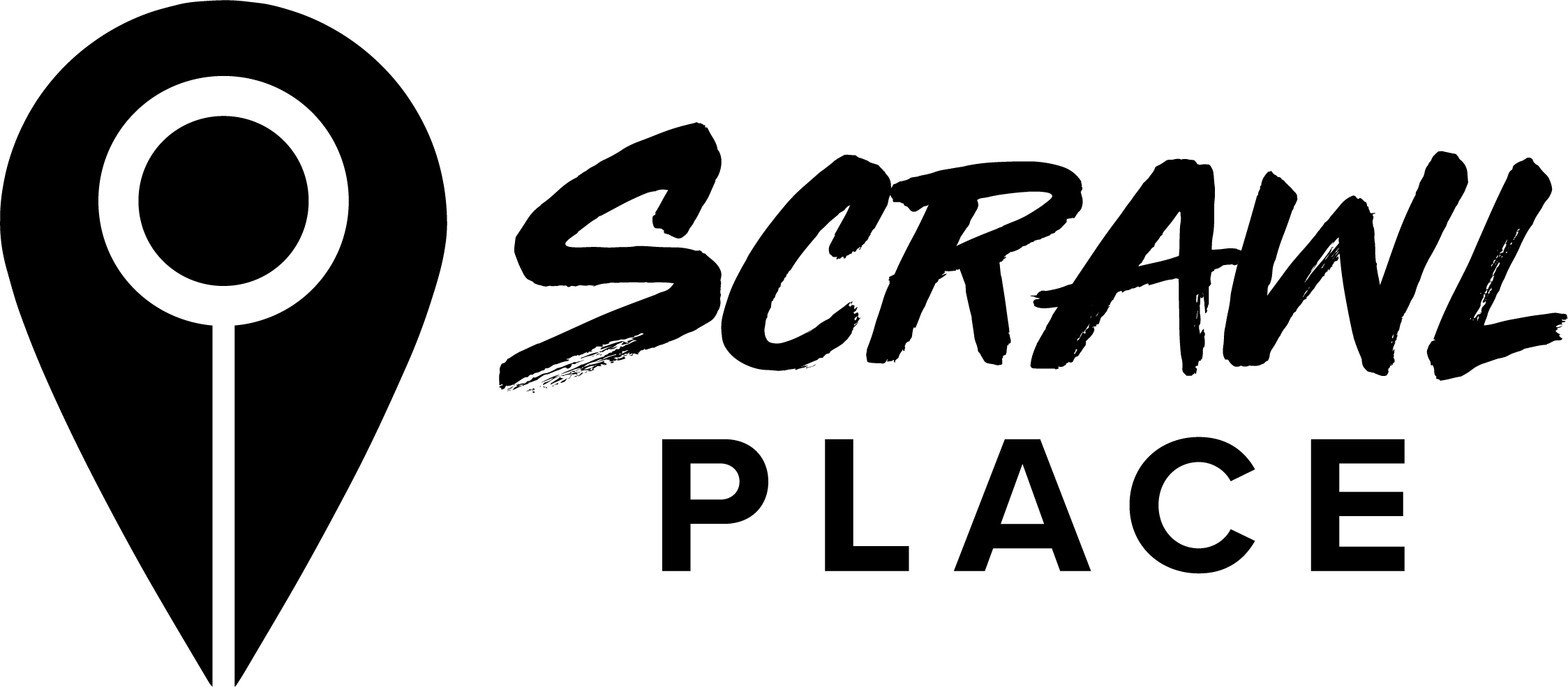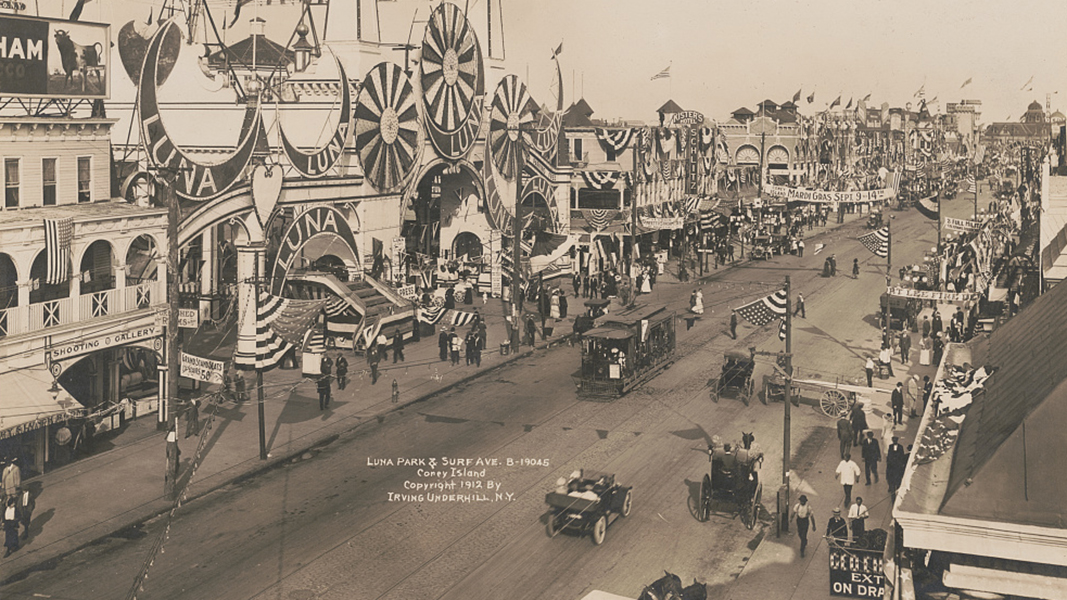This story, authored by newspaper columnist Yente Serdatsky, was first published in the Yiddish daily “Forverts” on July 3, 1921. The following translation, by Dalia Wolfson, was made possible with support from the Yiddish Book Center.
Summertime my friends go away. My friends are the readers, the dozens of thousands of men and women who care for the written word. It makes no difference who they are—rich shopkeepers, poor workers, girls full of longing, boys with little sense—but when they go away the city bores me, and I follow them out of town.
The closest place to find them en masse is Coney Island. The destination is a result of unfortunate factors: carfare is low, the place isn’t far, it’s easy to rent a room for the season. By day these folks work in the congested shops of our infernal city, but in the fleeting evenings they breathe in sea air. The breeze rolls out from the ocean to the farthest reaches of the island, brushing gently over weary faces. At night the winds grow bolder, their cool salted exhalations breaking into the cramped rooms, setting upon the bodies of sleepers, caressing them until they dream of unknown lands, azure oceans with dancing nymphs, beautiful golden-haired mermaids who dwell in palaces of clearest amber…
It’s Sunday, the dusk sky still glowing after a hot summer day. The hired car is moving fast, as though it would cross the globe in an hour or two. I’m also in a rush: I want to see my own, and on a day like this the small, rented rooms must be brimming with guests from the city. What are they doing? Have they eaten? Rested? Bathed? And how are they, after all that? Has the sun overly browned their naked necks, their bare arms? I worry more about the women: a woman looks more pathetic, and not at all pretty, when her delicate skin gets red from the sun.
The car hurries through the thickly-settled streets of downtown. On a warm evening like this everyone’s out, women, men, children; there’s a commotion but I can’t see or hear a thing, my thoughts carry me elsewhere. To Delancey Street. I open my eyes wider and consider the street, so wondrously festive: colorful lamps, wreaths of flowers, flags. Thousands of flags, big and small, wrap around houses, telephone poles, doors, windows, weaving between roofs and walls. Yellow stripes, yellow stars glint in the sunlight. The wind flutters along, and there’s a low hum in the air, as though the flags were murmuring some history that can’t be told in our human tongue.
Sometimes I understand the language of mute things more and better than our own ringing words…I turn to them: “Darling, brilliant flags! What holiday could it possibly be?”
They wave at me, as though in greeting, and whisper: “This isn’t our doing at all. They tied us tight. We want to be free, but our protests go unheard…”
“Why would you want to be free? Just look at how happy and merry you’ve made the street!”
And quietly they tell their tale: “They bound us here in honor of someone just like everyone else in the neighborhood. But he lived in luxury. And now?”
A powerful gust makes their bodies shudder. They whip about, snapping angrily. I can hear them clearly: “And now they want to name a street after him, hang up his picture in the center! And his people, his own kind, all these years they lived in poverty and died before their time, from bad air, too little food, disease. They left behind their children and their children’s children, all just as poor. And now these kids will have to look at his picture, they’ll admire it and be cheered…and then what will happen? Will they bow before him? Or will they see through it, and rage at this world’s injustice?”
The wind dies down. The flags lose hope: without the wind, there can be no revolution. I myself grow sad, and meanwhile the car reaches the Williamsburg Bridge.
We drive past Williamsburg, through Brooklyn, through poor, cramped neighborhoods where the ugly tenement houses are silhouetted black against the sunshine; through wealthier districts, past private stone homes, neat, spotless, curtains in the windows, verdant, blooming front yards.
The setting sun heads west, draping the streets in gold, more a dream than a vision…
We’re driving deep in Brooklyn when I start, alarmed: where did the people go? All the houses, scrubbed, tidy, with bushes and flowers by the doors, stand silently; the linens are lowered over windows, absorbing the rays. Their bright stripes stretch out, long and careless, while the sun pricks them with hot needles, and despite this they bear it all serenely, as if to say: “We shelter the weak and we take their suffering with love.” It is quiet, very quiet in the freshly-washed streets flanked by rows of overgrown trees, and the rare passerby. A few children play in a green garden, they grow bored and disappear somewhere into a doorway.
Two young girls in white dresses appear on the street; their petite feet in white shoes and socks step carefully on the gleaming stones at the edge of the street, their gazes wander, they look like two white doves who’ve left the nest against their will. Soon they find the wandering tiresome and disappear somewhere into a doorway.
The sun edges closer and closer to the west, the shadows of twilight grow longer and the silence more mysterious. Where are the people? What happened to them? Is this New York, the densely-packed city of seven million people, where an apartment is nowhere to be found, no matter the offer? Anxious, I look at the veiled windows: are they hiding inside? It’s easy to dream there, in that gold-lit, night-shaded mesh. I can see them all, in the cool cellars under the houses, in secret caverns with walls of diamond-encrusted white marble and ceilings of sapphires, and in the very middle—a diamond that dazzles like the sun.
What are they doing there? I have a thousand ideas: someone dreams there of love, someone else worships his god to his heart’s content. Upstairs, everything’s measured and weighed, you do another man’s bidding, follow a norm. But down in the depths, among marble and gold, among exquisite tapestries and precious gemstones, another kind of man comes to life: one of breadth, depth, abundance. His dream is bright, his passion is like potent, aged wine…
The machine rocks above the smooth road in the twilit silence, in my half-dream I can no longer see the vacated houses, nor the automobiles in pursuit on the same road, before and behind me. I am in the deep-set cellars together with the people who serve their hidden god in full freedom…
“Coney Island!” cries the chauffeur. I look around—Ah, there he is! He’s here! I call out aloud.
“Who’s here?” the driver wonders, looking around. I smile, dazed, and can’t respond: yes, that’s him! The one, the thousands of people, who left the neighborhood and made the streets empty. Yes, that’s them. They abandoned their clean, sweet-scented houses with the lowered shades over the windows and the trees and flowers out front and all their possessions inside. They’ve left behind cushioned, leather-upholstered chairs, turkish divans, marble baths, shelves of books by major talents, phonographs spinning the songs of world-class artists… They’ve left it all behind, but they didn’t descend to worship their hidden gods as I thought. No, these thousands of people wearied of all that syrupy stillness, and they went away to Coney Island to amuse themselves for a turn…
Underneath, blue currents flow
Above, the rays are golden-cast
And the storm beckons ever closer
To its eye: a place of rest.
The machine comes to a stop at Surf Avenue, a single brick in a massive black mobile wall. On the other side of the street: another dark wall of machines, and at the center—yet more cars, filled with people. They’re stretched out, one after the other. Maybe thousands, maybe tens of thousands. Who can count them all?
But I am not looking at them, now, nor at the amusement stands with their glittering lights and tinny music. I am looking at my people. There are no individuals: just two long, thick strips running up and down the length of the street. At first glance, like two rubber belts moving this way and that, hour after hour, commanded by the force that drives the machine…
How grim. Where is man, with his strong, proud, independent will? In a little while, the human strips start to show colors, ribbon-like: there go some young girls in thin silk dresses, not even sixteen, almost children. Pushing into the human mass, eyes wide, curious, delighted at everything, everyone. Brown eyes, black, blue, sparking from moment to moment; burning youth, flashing brighter than a prism in the light. There go a girl and a boy, bodies drawn to one another in the throng. Hands touching, mouths upturned, every supple limb singing. Tireless, they could move forever in this crowd, night and day…
A middle-aged pair, packed tight by the jostling. Both hands locked like chainlinks, bodies close, only their eyes roam sadly. They already know how it all ends, nothing is new—and yet they make no effort to detach from the mass. They keep a quick pace. A little later I catch them: they are smiling, their eyes are filmed over, foggy blue, their vision bringing them back to innocent, happy, young days…
Older men are woven into these strips. They walk one by one, some in finery, others in faded wear. Middle-aged women in sweaters woven of polychrome silk. Men, women, alone. They are lonely at home. Broken lives, bad businesses. Lost friends. Estranged children…all this, inside their houses. But here, in the crowd, you can’t feel it. Bodies press together, joy fills the air, eyes meet, and everything feels easier somehow. Drinking in another person’s breath like a strong, sweet liqueur, feeling light-headed…
A little while later I don’t notice myself being pulled into the human current.
Yente Serdatsky (1877–1962) was born in Eastern Europe, began her literary career in Warsaw and later relocated to New York City. Her short stories were printed in various periodicals, and Geklibene shriftn, a collected volume of her writings (including three sections of short stories, dramas, and fables), was published in 1913.
Dalia Wolfson is a scholar and writer living in Boston. She was a 2021 Yiddish Book Center Translation fellow and is currently editor of Texts & Translations at the journal In geveb.

